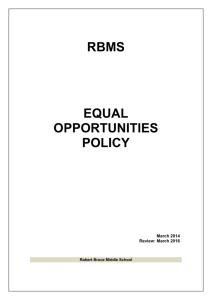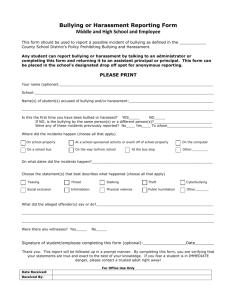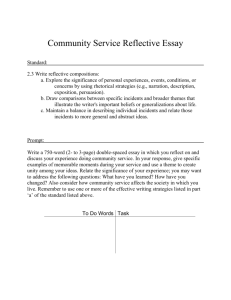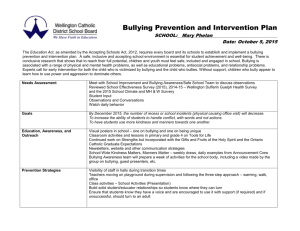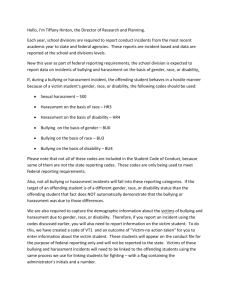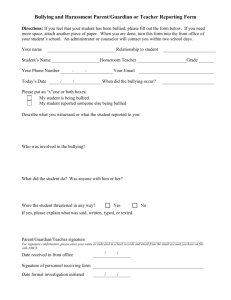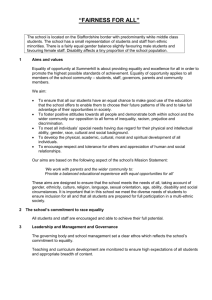St Teresa's Anti-Bullying Policy
advertisement
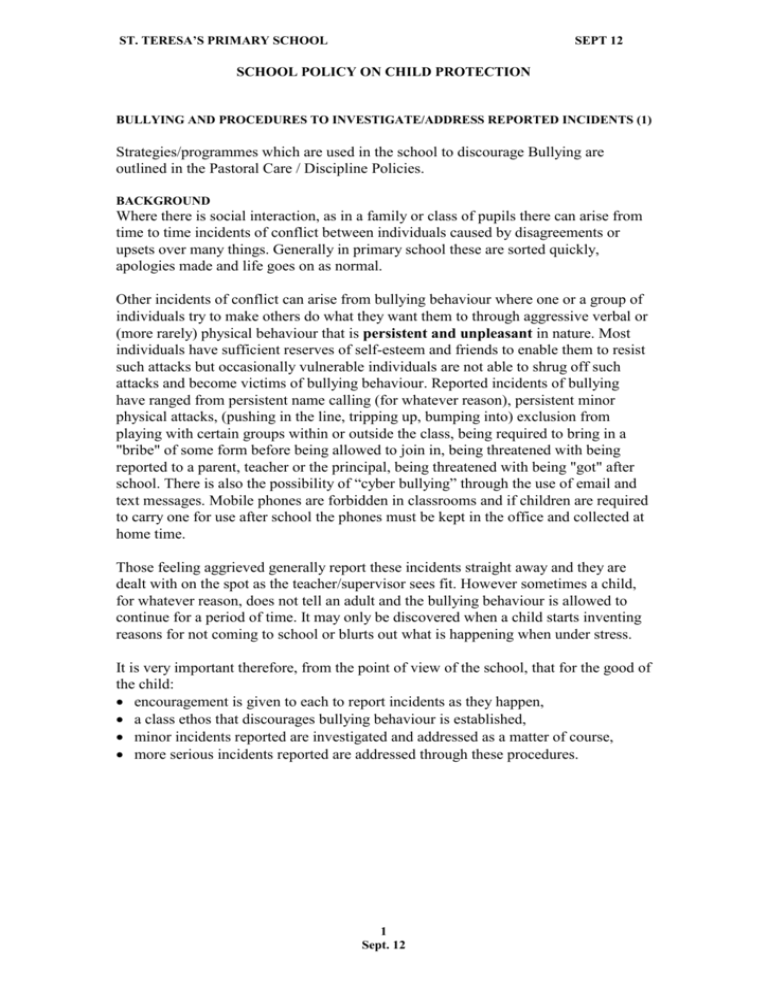
ST. TERESA’S PRIMARY SCHOOL SEPT 12 SCHOOL POLICY ON CHILD PROTECTION BULLYING AND PROCEDURES TO INVESTIGATE/ADDRESS REPORTED INCIDENTS (1) Strategies/programmes which are used in the school to discourage Bullying are outlined in the Pastoral Care / Discipline Policies. BACKGROUND Where there is social interaction, as in a family or class of pupils there can arise from time to time incidents of conflict between individuals caused by disagreements or upsets over many things. Generally in primary school these are sorted quickly, apologies made and life goes on as normal. Other incidents of conflict can arise from bullying behaviour where one or a group of individuals try to make others do what they want them to through aggressive verbal or (more rarely) physical behaviour that is persistent and unpleasant in nature. Most individuals have sufficient reserves of self-esteem and friends to enable them to resist such attacks but occasionally vulnerable individuals are not able to shrug off such attacks and become victims of bullying behaviour. Reported incidents of bullying have ranged from persistent name calling (for whatever reason), persistent minor physical attacks, (pushing in the line, tripping up, bumping into) exclusion from playing with certain groups within or outside the class, being required to bring in a "bribe" of some form before being allowed to join in, being threatened with being reported to a parent, teacher or the principal, being threatened with being "got" after school. There is also the possibility of “cyber bullying” through the use of email and text messages. Mobile phones are forbidden in classrooms and if children are required to carry one for use after school the phones must be kept in the office and collected at home time. Those feeling aggrieved generally report these incidents straight away and they are dealt with on the spot as the teacher/supervisor sees fit. However sometimes a child, for whatever reason, does not tell an adult and the bullying behaviour is allowed to continue for a period of time. It may only be discovered when a child starts inventing reasons for not coming to school or blurts out what is happening when under stress. It is very important therefore, from the point of view of the school, that for the good of the child: encouragement is given to each to report incidents as they happen, a class ethos that discourages bullying behaviour is established, minor incidents reported are investigated and addressed as a matter of course, more serious incidents reported are addressed through these procedures. 1 Sept. 12 PROCEDURES FOR ADDRESSING ALLEGED INCIDENT/S OF BULLYING (2) Through our policies and vigilance of the children while they are in our care bullying is not common in the school. However as in all social organisations it can arise and it is important that if this happens incidents are investigated, addressed, recorded and monitored in order to minimise the effects on both the victim/s and bully/bullies. Incidents of bullying are normally reported by a child to his/her teacher or parent. Children are encouraged to do this as no steps to address problems can be taken if they are not first disclosed. We have developed these procedures from recording, addressing and monitoring reported incidents. They will be followed in all reported cases and adapted when and if this becomes necessary. All alleged cases of bullying reported will be recorded, addressed and reviewed through these procedures until this is no longer considered necessary. All incidents reported by legitimate sources (parent/guardian, child, peer, staff member, etc.) will be treated as worthy of investigation until subsequently proven otherwise. MINOR REPORTED INCIDENTS OF BULLYING BEHAVIOUR 1a. In the first incidence, regardless of from or to whom the incident/s were reported the alleged bullying will be reported to the class teacher who will then investigate by talking to the alleged victim and finding out: who was involved in the alleged bullying; what was said, or what actions were taken and what the consequences of these were; when and where these incidents are alleged to have occurred; the names of any independent first-hand witnesses. 1b. If this investigation uncovers details of incidents which do need addressing the teacher will discuss with the alleged bully what has been said about his/her behaviour and if bullying behaviour is admitted will try to ascertain why the child has chosen to behave in such a way. Disciplinary action may be taken if appropriate. In either case the teacher will give the Head of Pastoral Care and Discipline/Vice-Principal brief details in writing of the alleged incident/s and outcomes of the investigations. All such reports will be filed. 1c. Through this investigation it should be possible to determine class-based strategies which will discourage such behaviour in the short term; e.g. telling child that bullying behaviour is not acceptable in school and parents / principal will be informed if it continues and disciplinary action taken according to school policy, telling the bullied child to report any further incidents as they happen, ensuring that the child has a friend or buddy to play with during break, etc. separating and/or closely monitoring children involved at times when such behaviour is likely to happen, alerting others who may be supervising the children during the day, ensuring that the bullied child is escorted from school by friends or family and is not left open to attack on the way home. 2 Sept. 12 1d. Strategies should also be employed to rebuild friendships / relationships for the long term and to teach children how to express their feelings and to play in an atmosphere of mutual self-respect. Particularly useful here is regular use of Circle Time and also parts of the Religion and the Kidscape/Anti-bullying programmes. PROCEDURES FOR ADDRESSING ALLEGED INCIDENT/S OF BULLYING (3) REPORTING BY/TO PARENTS 2a. Where a parent has reported an incident or incidents within a class that has / have been subsequently investigated the results of the investigation and the steps (if any) that have been deemed necessary by the teacher to address the issue will be communicated to the Vice-Principal in writing .(See proforma) The principal will also be given these details. 2b. Where a parent has reported an incident or incidents within several classes the Vice-Principal will investigate and report as above. 2b. The parents of the child allegedly being bullied and those of any other children who have been involved will also be informed of the investigations and outcome at a meeting arranged for this purpose or on the telephone by the Vice-Principal. 2c. Both/all sets of parents will be asked to inform the school immediately of any further incidents occurring in school and a review of the situation as they see it will be conducted at a date agreed and at the next and if necessary, subsequent parent-teacher interview/s. 2.d. Reports of cyber bullying will be investigated by the Vice-Principal and the details and outcomes reported to relevant parents UNADMITTED, MORE SERIOUS OR CONTINUING INCIDENTS. 3a. Unadmitted, more serious or continuing incidents will be reported to the VicPrincipal who will invite parents in to discuss the matter and enlist their support in the action/ strategies to be employed in the school to improve the situation. 3b. Situations which do not improve will be referred to the principal. 3c. Situations which still do not improve and in which parental support for the school is not evident will be referred to the Board of Governors. 3 Sept. 12
